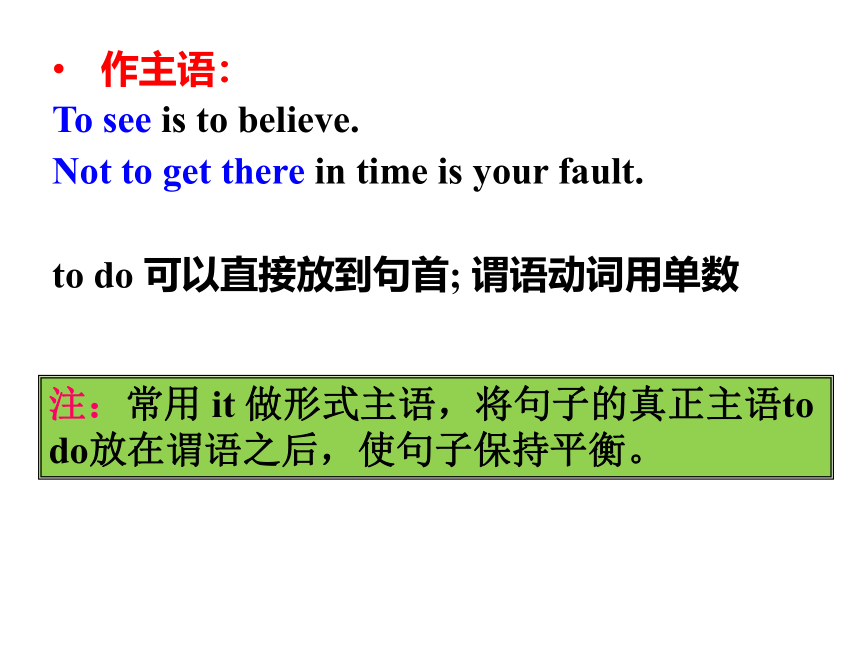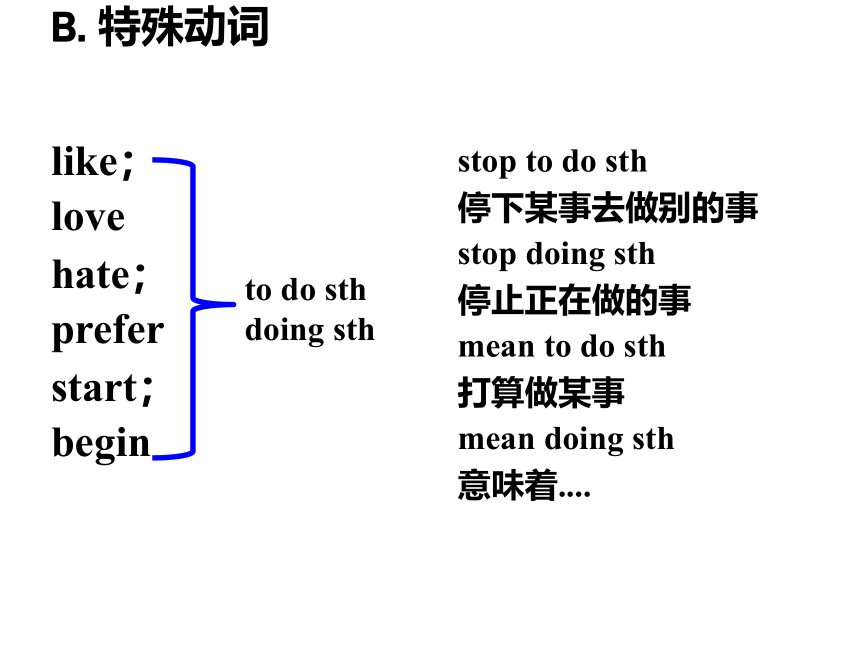中考复习专题:非谓语动词课件(27张PPT)
文档属性
| 名称 | 中考复习专题:非谓语动词课件(27张PPT) |

|
|
| 格式 | zip | ||
| 文件大小 | 484.5KB | ||
| 资源类型 | 教案 | ||
| 版本资源 | 人教新目标(Go for it)版 | ||
| 科目 | 英语 | ||
| 更新时间 | 2020-06-06 00:00:00 | ||
图片预览









文档简介
(共27张PPT)
He
likes
to
read
the
Harry
Potter.
谓语动词
动词1
动词2
动词2根据动词1的变化
而变化,那么我们看到
动词2
(to
do,
doing,
done三种不同形式)就是非谓语动词。
什么是非谓语动词?
一个句子当中,已经存在一个主句(谓语动词),
又没有连词的情况下,
还有别的动词出现时。
She
got
off
the
bus,
leaving
her
handbag
on
her
seat.
2.
非谓语动词在什么条件下使用?
非谓语动词
doing
done
to
do
to
do
动词不定式
一、基本构成
二、句法作用
在句中可作主语、宾语、宾语补足语、表语、定语、状语等成份。
肯定式:to
do
sth
否定式:not
to
do
sth.
作主语:
To
see
is
to
believe.
Not
to
get
there
in
time
is
your
fault.
to
do
可以直接放到句首;
谓语动词用单数
注:常用
it
做形式主语,将句子的真正主语to
do放在谓语之后,使句子保持平衡。
句型1:It
+
谓语
+
to
do
It
takes
us
an
hour
to
get
there
by
bus.
句型2:It’s
+
n.
+
to
do
It’s
our
duty
to
help
the
poor.
句型3:It
is
adj.
for/of
sb.
to
do
sth.
It
is
important
for
us
to
learn
English
well.
It
is
very
kind
of
you
to
give
me
some
help.
2.
作宾语
want,
need
,
decide,
agree,
hope,
wish,
expect,
promise,
refuse,
offer,
fail,
manage,
learn,
seem,
plan,
prepare,
afford,would
like......
+
to
do
sth
I
don’t
expect
to
meet
you
here.
We
need
to
study
hard
in
class.
She
refused
to
accept
his
invitation
to
the
party.
A.
动词后的宾语
stop
to
do
sth
停下某事去做别的事
stop
doing
sth
停止正在做的事
mean
to
do
sth
打算做某事
mean
doing
sth
意味着....
like;
love
hate;
prefer
start;
begin
B.
特殊动词
to
do
sth
doing
sth
3.
作宾语补足语
Mother?told?me?to
come?back?before?10?o’clock.
2.
I’ll?get?someone
to
repair?the?computer
for?you.
3.
He
asked
me
to
do
the
work
with
him
tell
sb
to
do
sth
get
sb
to
do
sth
ask
sb
to
do
sth
advise,
allow,
ask,
tell,
expect
,
encourage,
force
,
invite,
order,
wish,?want,
warn,
remind,
promise,
request…...+
sb
to
do
sth
A:
常见动词
B:
特殊动词
feel
hear
listen
to
let
make
have
see
watch
look
at
notice
help
....
+
sb
do
sth
The
boss
made
her
work
long
hours.
I
saw
him
enter
the
cinema.
2.
记忆口诀:
一感
二听
三让
四看
半帮助
I
find
it
not
hard
to
learn
English
well.
?
I
find
to
learn
English
well
is
not
hard.
4.
it作形式宾语的句型
主+
find/think/feel/make/
consider+it+adj/n
+
to
do
sth.
1.?I?feel?_____?my?duty?_____?change?all?that.
2.We
think
______
important
_____
obey
the
laws.
it
to
it
to
1.
The
headteacher
is
always
the
first
person
to
arrive
at
school.
He
is
looking
for
a
room
to
live
in.
5.
to
do
不定式作定语
修饰词前有the
first,
the
last时,常用to
do
作定语
若为不及物动词,介词不能丢
6.
作状语
表示目的、原因、结果或条件。
He
studies
very
hard
to
get
good
grades.
To
catch
the
bus,
he
always
gets
up
very
early.
to
do
1.
作主语?谓语单数;常用三个句型
2.
作宾语?常见动词
特殊动词
3.
作宾补?
常见动词
4.
It作形式宾语的句型(五个动词)
5.
理解作定语、
状语
doing
动名词
/
现在分词
一、基本构成
二、句法作用
在句中可作主语、宾语、宾语补足语、表语、定语、状语等成份。
肯定式:doing
sth
否定式:not
doing
sth
1)
Studying
hard
is
the
duty
of
a
student.
doing作主语,谓语动词用单数。
2)
It
代替doing
在句子中作形式主语。
It
is
a
waste
of
time
doing
sth
It
is
no
good
/
no
use
doing
sth
1.
做主语
2.
作宾语
Have
you
finished
reading
the
book?
以下动词只能跟doing作宾语:
enjoy,
finish,
keep,
practice,
avoid,
miss,
stand,
mind,
risk,
imagine....
短语:put
off,
give
up,
feel
like,
can’t
help....
A:动词宾语
(1)常见动词
A:动词宾语
(2)特殊动词
advise/allow/forbid禁止/permit允许+doing
advise/allow/forbid禁止/permit允许
+sb
to
do
sth
We
don’t
allow
people
to
fish
here.
We
don’t
allow
smoking
in
office.
Please
remember
to
turn
off
the
light
when
you
leave
the
room.
I
remember
seeing
him
somewhere
before.
B:介词宾语
be
busy
(in);
have
difficulties
/
trouble
/
problems
(in)....
+
doing
sth
be
used
to;
stick
to;
look
forward
to;
pay
attention
to
......
+
doing
sth
He
has
much
trouble
learning
English.
My
grandma
is
used
to
having
a
walk
after
supper.
3.
作宾语补足语:
see,
notice,
watch,
feel,
hear,
smell,
find,
keep,
get,
have,
catch...+
sb
doing
sth
?
表示一个正在持续的动作或状态。
I
caught
her
smoking
in
the
bathroom.
I’m
sorry
to
have
kept
you
waiting
so
long.
I
smelt
something
burning.
4.
作定语:
The
English
language
has
an
interesting
history.
This
is
the
path
leading
to
the
school.
China
is
a
developing
country.
5.
作状语:
(时间,原因,结果,条件,让步,伴随......)
The
fire
lasted
a
night,
causing
great
damage.(结果)
We
walked
along
the
river
bank,
talking
and
laughing.
(伴随)
(独立分词放前面,分词短语放后面)
doing
1.
作主语?
谓语单数;it作形式主语句型
2.
作宾语:
常见动词,动词短语
特殊动词
省略介词的短语;
有介词to的短语
3.
作宾补?
常见动词
4.
了解
作定语和状语
done
过去分词
Japan
is
a
developed
country.
(表完成)
区别
China
is
a
developing
country.
(表进行)
2.
He
was
reading
a
novel
written
by
Dickens.
(表被动)
3.
She
was
excited
about
the
result
of
his
exam.
区别:The
result
of
his
exam
was
very
exciting.
excite,
surprise,
amaze,
amuse,
confuse,
disappoint,
interest,
tire,
worry,
move,
inspire......
-ed的分词?sb
-ing的分词?
sth
非
谓
语
动
词
to
do
1.
作主语?谓语单数;常用三个句型
2.
作宾语?常见动词
特殊动词
3.
作宾补?
常见动词
4.
It作形式宾语的句型(五个动词)
5.
理解作定语、
状语
doing
1.
作主语?
谓语单数;it作形式主语句型
2.
作宾语:
常见动词,动词短语
特殊动词
常省略介词的短语;
带有介词(to)的短语
3.
作宾补?
常见动词
4.
了解
作定语和状语
done
表完成;表被动;-ed分词与-ing
分词的区别
He
likes
to
read
the
Harry
Potter.
谓语动词
动词1
动词2
动词2根据动词1的变化
而变化,那么我们看到
动词2
(to
do,
doing,
done三种不同形式)就是非谓语动词。
什么是非谓语动词?
一个句子当中,已经存在一个主句(谓语动词),
又没有连词的情况下,
还有别的动词出现时。
She
got
off
the
bus,
leaving
her
handbag
on
her
seat.
2.
非谓语动词在什么条件下使用?
非谓语动词
doing
done
to
do
to
do
动词不定式
一、基本构成
二、句法作用
在句中可作主语、宾语、宾语补足语、表语、定语、状语等成份。
肯定式:to
do
sth
否定式:not
to
do
sth.
作主语:
To
see
is
to
believe.
Not
to
get
there
in
time
is
your
fault.
to
do
可以直接放到句首;
谓语动词用单数
注:常用
it
做形式主语,将句子的真正主语to
do放在谓语之后,使句子保持平衡。
句型1:It
+
谓语
+
to
do
It
takes
us
an
hour
to
get
there
by
bus.
句型2:It’s
+
n.
+
to
do
It’s
our
duty
to
help
the
poor.
句型3:It
is
adj.
for/of
sb.
to
do
sth.
It
is
important
for
us
to
learn
English
well.
It
is
very
kind
of
you
to
give
me
some
help.
2.
作宾语
want,
need
,
decide,
agree,
hope,
wish,
expect,
promise,
refuse,
offer,
fail,
manage,
learn,
seem,
plan,
prepare,
afford,would
like......
+
to
do
sth
I
don’t
expect
to
meet
you
here.
We
need
to
study
hard
in
class.
She
refused
to
accept
his
invitation
to
the
party.
A.
动词后的宾语
stop
to
do
sth
停下某事去做别的事
stop
doing
sth
停止正在做的事
mean
to
do
sth
打算做某事
mean
doing
sth
意味着....
like;
love
hate;
prefer
start;
begin
B.
特殊动词
to
do
sth
doing
sth
3.
作宾语补足语
Mother?told?me?to
come?back?before?10?o’clock.
2.
I’ll?get?someone
to
repair?the?computer
for?you.
3.
He
asked
me
to
do
the
work
with
him
tell
sb
to
do
sth
get
sb
to
do
sth
ask
sb
to
do
sth
advise,
allow,
ask,
tell,
expect
,
encourage,
force
,
invite,
order,
wish,?want,
warn,
remind,
promise,
request…...+
sb
to
do
sth
A:
常见动词
B:
特殊动词
feel
hear
listen
to
let
make
have
see
watch
look
at
notice
help
....
+
sb
do
sth
The
boss
made
her
work
long
hours.
I
saw
him
enter
the
cinema.
2.
记忆口诀:
一感
二听
三让
四看
半帮助
I
find
it
not
hard
to
learn
English
well.
?
I
find
to
learn
English
well
is
not
hard.
4.
it作形式宾语的句型
主+
find/think/feel/make/
consider+it+adj/n
+
to
do
sth.
1.?I?feel?_____?my?duty?_____?change?all?that.
2.We
think
______
important
_____
obey
the
laws.
it
to
it
to
1.
The
headteacher
is
always
the
first
person
to
arrive
at
school.
He
is
looking
for
a
room
to
live
in.
5.
to
do
不定式作定语
修饰词前有the
first,
the
last时,常用to
do
作定语
若为不及物动词,介词不能丢
6.
作状语
表示目的、原因、结果或条件。
He
studies
very
hard
to
get
good
grades.
To
catch
the
bus,
he
always
gets
up
very
early.
to
do
1.
作主语?谓语单数;常用三个句型
2.
作宾语?常见动词
特殊动词
3.
作宾补?
常见动词
4.
It作形式宾语的句型(五个动词)
5.
理解作定语、
状语
doing
动名词
/
现在分词
一、基本构成
二、句法作用
在句中可作主语、宾语、宾语补足语、表语、定语、状语等成份。
肯定式:doing
sth
否定式:not
doing
sth
1)
Studying
hard
is
the
duty
of
a
student.
doing作主语,谓语动词用单数。
2)
It
代替doing
在句子中作形式主语。
It
is
a
waste
of
time
doing
sth
It
is
no
good
/
no
use
doing
sth
1.
做主语
2.
作宾语
Have
you
finished
reading
the
book?
以下动词只能跟doing作宾语:
enjoy,
finish,
keep,
practice,
avoid,
miss,
stand,
mind,
risk,
imagine....
短语:put
off,
give
up,
feel
like,
can’t
help....
A:动词宾语
(1)常见动词
A:动词宾语
(2)特殊动词
advise/allow/forbid禁止/permit允许+doing
advise/allow/forbid禁止/permit允许
+sb
to
do
sth
We
don’t
allow
people
to
fish
here.
We
don’t
allow
smoking
in
office.
Please
remember
to
turn
off
the
light
when
you
leave
the
room.
I
remember
seeing
him
somewhere
before.
B:介词宾语
be
busy
(in);
have
difficulties
/
trouble
/
problems
(in)....
+
doing
sth
be
used
to;
stick
to;
look
forward
to;
pay
attention
to
......
+
doing
sth
He
has
much
trouble
learning
English.
My
grandma
is
used
to
having
a
walk
after
supper.
3.
作宾语补足语:
see,
notice,
watch,
feel,
hear,
smell,
find,
keep,
get,
have,
catch...+
sb
doing
sth
?
表示一个正在持续的动作或状态。
I
caught
her
smoking
in
the
bathroom.
I’m
sorry
to
have
kept
you
waiting
so
long.
I
smelt
something
burning.
4.
作定语:
The
English
language
has
an
interesting
history.
This
is
the
path
leading
to
the
school.
China
is
a
developing
country.
5.
作状语:
(时间,原因,结果,条件,让步,伴随......)
The
fire
lasted
a
night,
causing
great
damage.(结果)
We
walked
along
the
river
bank,
talking
and
laughing.
(伴随)
(独立分词放前面,分词短语放后面)
doing
1.
作主语?
谓语单数;it作形式主语句型
2.
作宾语:
常见动词,动词短语
特殊动词
省略介词的短语;
有介词to的短语
3.
作宾补?
常见动词
4.
了解
作定语和状语
done
过去分词
Japan
is
a
developed
country.
(表完成)
区别
China
is
a
developing
country.
(表进行)
2.
He
was
reading
a
novel
written
by
Dickens.
(表被动)
3.
She
was
excited
about
the
result
of
his
exam.
区别:The
result
of
his
exam
was
very
exciting.
excite,
surprise,
amaze,
amuse,
confuse,
disappoint,
interest,
tire,
worry,
move,
inspire......
-ed的分词?sb
-ing的分词?
sth
非
谓
语
动
词
to
do
1.
作主语?谓语单数;常用三个句型
2.
作宾语?常见动词
特殊动词
3.
作宾补?
常见动词
4.
It作形式宾语的句型(五个动词)
5.
理解作定语、
状语
doing
1.
作主语?
谓语单数;it作形式主语句型
2.
作宾语:
常见动词,动词短语
特殊动词
常省略介词的短语;
带有介词(to)的短语
3.
作宾补?
常见动词
4.
了解
作定语和状语
done
表完成;表被动;-ed分词与-ing
分词的区别
同课章节目录
- 词法
- 名词
- 动词和动词短语
- 动词语态
- 动词时态
- 助动词和情态动词
- 非谓语动词
- 冠词
- 代词
- 数词和量词
- 形容词副词及其比较等级
- 介词和介词短语
- 连词和感叹词
- 构词法
- 相似、相近词比较
- 句法
- 陈述句
- 一般疑问句和否定疑问句
- 特殊疑问句及选择疑问句
- 反意疑问句
- 存在句(There be句型)
- 宾语从句
- 定语从句
- 状语从句
- 主谓一致问题
- 简单句
- 并列句
- 复合句
- 主谓一致
- 主、表语从句
- 名词性从句
- 直接引语和间接引语
- 虚拟语气
- 感叹句
- 强调句
- 倒装句
- 祈使句
- 句子的成分
- 句子的分类
- 题型专区
- 单项选择部分
- 易错题
- 完形填空
- 阅读理解
- 词汇练习
- 听说训练
- 句型转换
- 补全对话
- 短文改错
- 翻译
- 书面表达
- 任务型阅读
- 语法填空
- 其他资料
